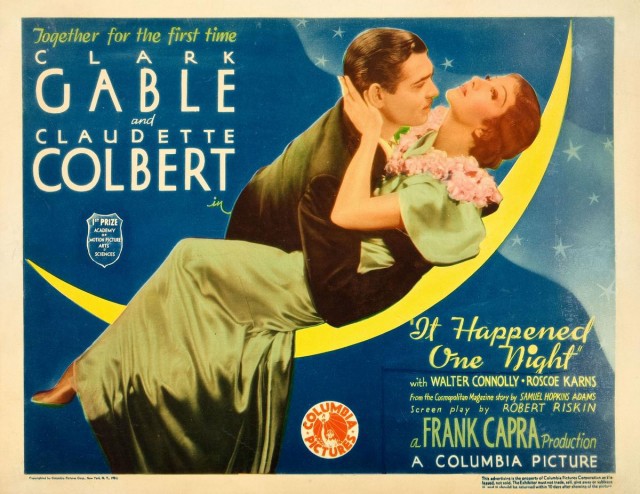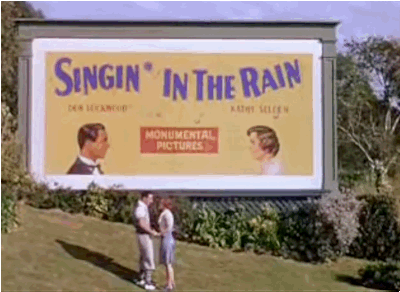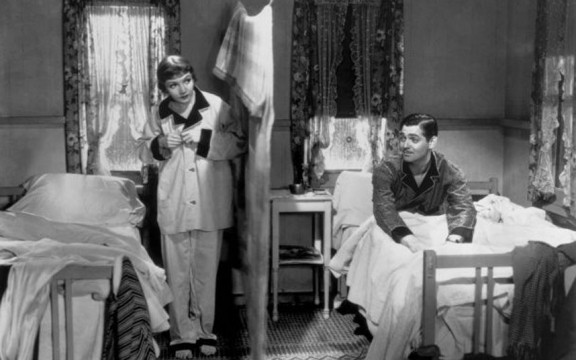The Hairpin Rom Com Club: It Happened One Night
by Chloe Angyal

Welcome back to the Hairpin Rom Com Club, where every two weeks we watch a different rom com together. It’s like a book club but without the passive aggression over which host has the best snacks.
This week’s movie is It Happened One Night, directed by Frank Capra and released in 1934, and widely acknowledged to be the point where Hollywood romantic comedy begins in earnest. It stars Clark Gable and Claudette Colbert, with a major supporting role going to The Great Depression.
A quick plot summary for those of you who haven’t seen it: Ellie Andrews (Colbert) is a rebellious heiress who, against her father’s wishes, has married a similarly filthy rich person by the name of King Westley. When her father threatens to have the marriage annulled, Ellie jumps off his yacht and swims to shore, then runs away, determined to make it from Miami to New York to be with her forbidden love.
Then we meet Peter Warne (Gable), a journalist with a talent for getting a good story and a habit of drunkenly mouthing off to his boss. He gets fired, but when he finds himself on a bus sitting next to Ellie Andrews, whose her father has sounded the alarm and promised an enormous reward to the person who finds her, Warne calls his boss and promises him the story of the decade. He makes a deal with Ellie: if she consents to give him an exclusive, he’ll help her get to New York. If not, he’ll turn her in to her father and collect the reward.
From there, it’s your standard we-dislike-each-other-but-we-have-to-work-together rom com. Along the road, they have to pretend to be husband and wife, and in doing this they come to not-hate each other, then like each other, then love each other. But they have a falling out, and Ellie runs back to Westley. On their do-over wedding day, Peter shows up to claim his money from her father: not the reward money, but reimbursement for all the things he had to hock to get the two of them from Miami to New York. Ellie pulls a runaway bride at the very last minute, and she and Peter live happily ever after.
Throughout the movie, the central tension between Peter and Ellie is that she’s rich and he’s broke. She’s a spoiled brat, and he’s a man of the people. On the road, with no sense of how to budget her money or fend for herself financially, she needs Peter to survive. He, of course, needs her in order to keep his job. This tension makes a lot more sense when you consider the larger context in which the movie was made and released. It’s 1934, it’s the middle of the Great Depression, everything is shit, everyone has a hangover thanks to Prohibition and its recent repeal, most Americans are miserable. Little wonder, then, that Peter gives Ellie so many resounding verbal beatings, and takes her to task so often for being spoiled and out of touch with real people. Little wonder that he takes so much satisfaction in seeing her brought financially low on the road and relishes the fact that he knows how to live on a tight budget, while she doesn’t.
Peter is meant to be a stand-in for the 99%, Ellie for the 1% who screwed the country over and were still barely dented by the Depression. Along the road, they meet people who are even worse off as a result of America’s economic woes, like the young boy who is riding a bus with his parents all way up the East Coast because his father was promised a job in New York City; the family’s spent all their money on bus tickets, and his mother passes out from hunger. A lot of screwball movies from this time period ignore the Great Depression and continue to tell stories about rich people who are untouched by the poverty and panic around them, but It Happened One Night doesn’t do that. It is explicitly a story about class, and about a roguish but decent working-class man who humanizes, and falls in love with, a pampered rich woman. In fact, if you recognize the hitchhiking scene from It Happened One Night, in which Ellie’s leg pulls over more cars than Peter’s thumb, it might be because it was featured in Sex and the City 2, in which Carrie and the girls go to Abu Dhabi to be mortifyingly ignorant about Arabic culture: cultural embarrassadors, if you will. Sex and the City 2, released in 2010 when the economy was once again in the shitter, and concerned mainly with the sex lives of four obscenely wealthy women, is an example of how not to make a movie during economic hard times. It Happened One Night was, at least, much less tone-deaf.
The other thing you need to know about It Happened One Night is that 1934 was the year that the Motion Picture Production Code, also known as the Hays Code, went into effect. The Hays Code was a set of regulations that banned the depiction of a host of things in Hollywood movies. These included: “first night scenes,” i.e. sex, miscegenation, drug use, mockery of the clergy, and “lustful kissing,” which accounts for the vast amount of lustless kissing that takes place in Hollywood movies between 1934 and the 1950s, when the Hays Code began to be phased out (I’m looking at you, final shot of Singin’ in the Rain).

The basic idea behind the Hays Code was that watching movies shouldn’t lower the moral character of the viewers, which is both admirable and adorably naïve to us here in 2014. In an effort to avoid government censorship, the studios drew up the guidelines themselves and agreed to stick to them: any film that violated the Hays Code could be denied release, and if a studio released the film anyway, they’d be issued a hefty fine. Which means that there are lots of moments in romantic comedies from the 1930s and 1940s when characters should be sleeping with each other (or at least kissing lustfully) but instead, trade verbal barbs or hit each other gently: the Hays Code is the reason we have the screwball comedy in the first place.
It’s important to know this when you get to the famous “Wall of Jericho” scene in In Happened One Night. Peter and Ellie are staying in a one room cabin at a campsite, and they only have enough money for one room. It has two beds, but still, they have to pretend to be married in order to be given the room at all. Ellie doesn’t want to stay in the same room as Peter, but it’s pouring outside, and financially, she’s out of options. Peter proceeds to hang a laundry line down the middle of the room and throw a blanket over it, creating a curtain between the two beds. He calls it the Wall of Jericho, and tells Ellie that he doesn’t have any trumpet with which to blow it down. Ellie is standing petrified at the door, and so Peter does what any sensitive, non-rapey man would do when trying to set a woman at ease: he takes off his clothes.

This scene is very well-known, and it’s notable for two reasons. The first is that it plays with the Hays Code in a cheeky way: as Peter’s undressing, he’s pretending to be concerned about his own privacy and his own modesty. He’s trying to get Ellie to stop looking at him, to get her over onto the other side of the curtain so that she won’t see him naked. He’s asking the same thing of the audience, and taunting the censors, as if to say, “I don’t want you to see me naked, but you’re going to have to look away or stop me if you don’t want this to go any further.” (Also, this scene reveals that Peter Warne doesn’t wear undershirts, and this, though the anecdote may be apocryphal, is said to have resulted in an enormous drop in undershirt sales. If Clark Gable doesn’t wear them, why would you?). But this scene is notable for another reason, which is that it’s rapey. Poor Ellie is standing in the doorway, trying to decide whether it’s safe for her to spend the night in a cabin with this guy she barely knows, and the asshole starts taking his clothes off. And yeah, he’s all glib about it, and he slickly delivers this rather well-written bit about how every man takes his clothes off in a different order, like a fucking stripping snowflake, but let’s not allow that to distract us from what a creeper this guy is.
And since this is a romantic comedy, she falls for that creeper, and we’re expected to be happy about it. Ain’t love grand?
Previously: Notting Hill
Chloe Angyal is a freelance journalist and is thisclose to getting her PhD in Romantic Comedies — er, Media Studies — from the University of New South Wales. You can read more of her writing here and follow her on Twitter at @chloeangyal.